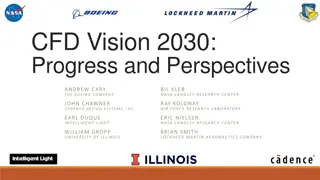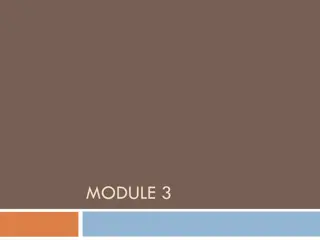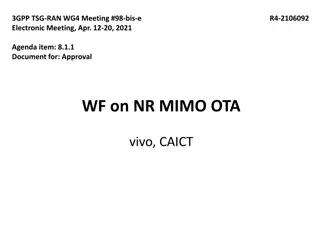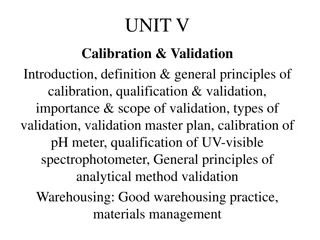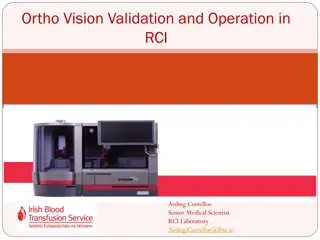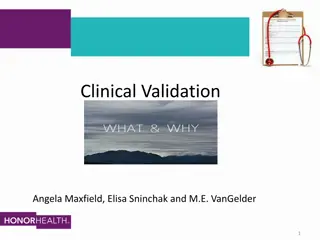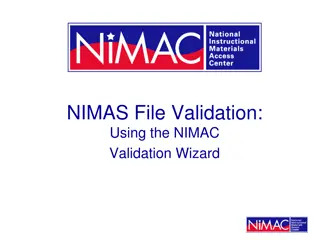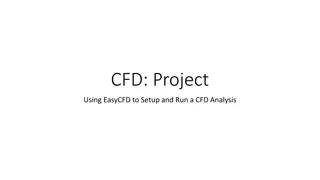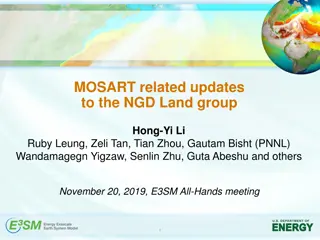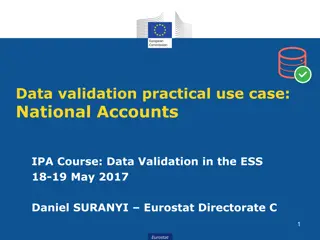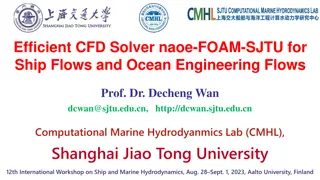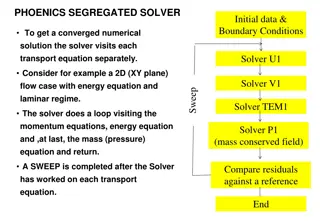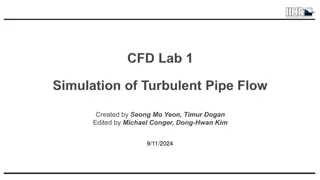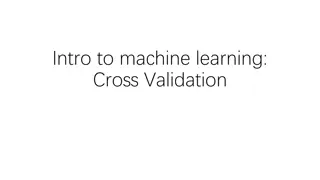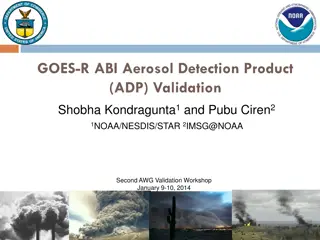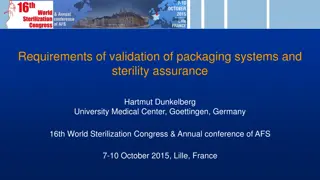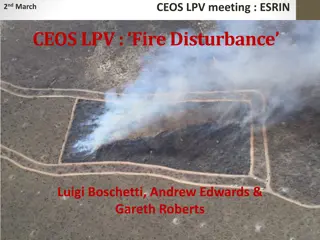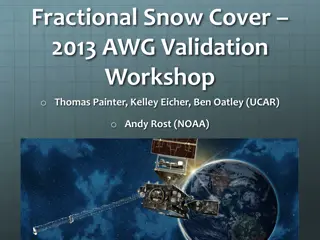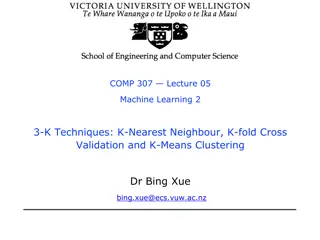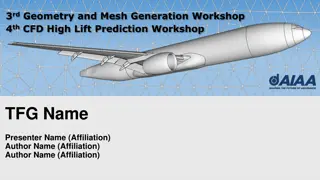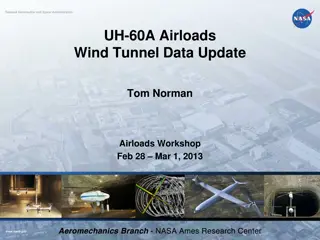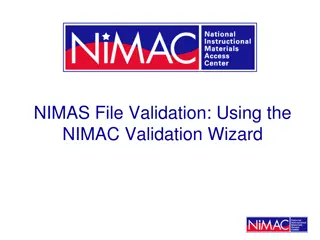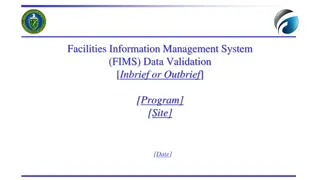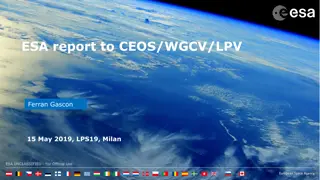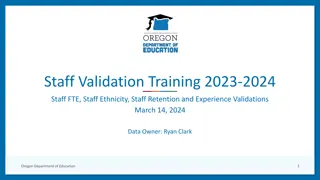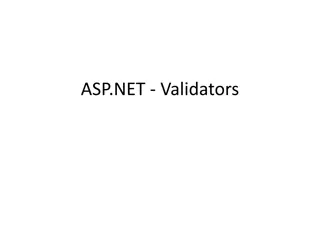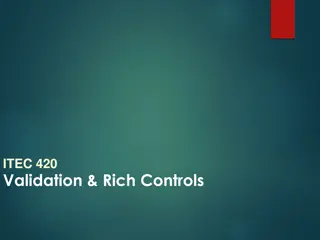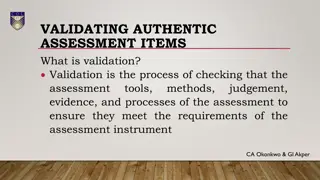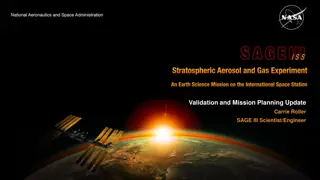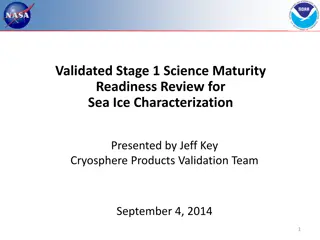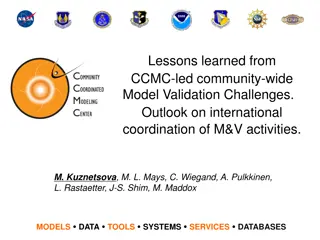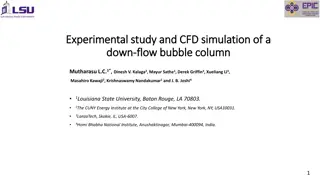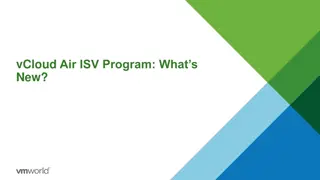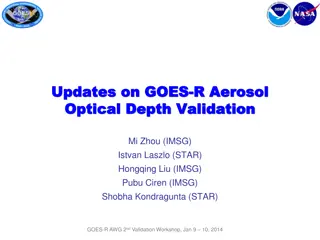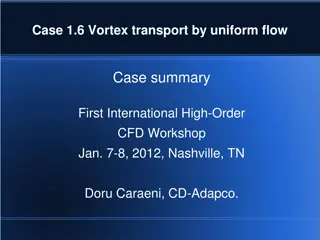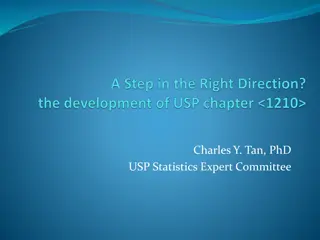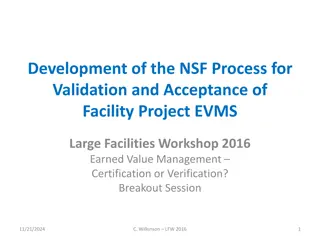Progress Toward CFD Vision 2030: Industry Insights and Challenges
Industry progress towards the CFD Vision 2030 is ongoing but slower than desired, with many milestones being delayed. However, there is increasing clarity on the necessary requirements. Further details will be available on www.cfd2030.com/report, including literature reviews, updated roadmaps, and o
0 views • 6 slides
Understanding Evaluation and Validation Methods in Machine Learning
Classification algorithms in machine learning require evaluation to assess their performance. Techniques such as cross-validation and re-sampling help measure classifier accuracy. Multiple validation sets are essential for comparing algorithms effectively. Statistical distribution of errors aids in
0 views • 95 slides
Approval and Validation Updates for NR MIMO OTA in 3GPP TSG-RAN.WG4 Meeting
The 3GPP TSG-RAN.WG4 Meeting discussed approval for the NR MIMO OTA workplan, addressed FR2 blocking issues, and emphasized the use of polarized antenna models. Updates were made to the power validation procedure and gNB beams usage criteria for FR1 MIMO OTA channel model validation. Collaboration w
1 views • 8 slides
Principles of Calibration, Validation, and Warehousing in Pharmaceutical Quality Assurance
Calibration and validation are critical processes in maintaining the quality of pharmaceutical products. Validation ensures that processes result in expected outcomes consistently, meeting quality standards. Qualification is an essential part of validation, ensuring that equipment and systems perfor
1 views • 37 slides
Ortho Vision Validation and Operation in RCI
Role of RCI laboratory, analyser requirements, validation process, installation verification, and PQ testing for Ortho Vision system. The RCI laboratory plays a crucial role in various testing processes including blood grouping, antibody ID, and compatibility testing. Validation process includes URS
0 views • 17 slides
Understanding Clinical Validation and DRG Validation in Healthcare
Clinical validation ensures that diagnoses documented in a patient's record align with accepted clinical criteria, while DRG validation focuses on matching hospital-coded information with physician descriptions and patient records. Clinical validation involves a review by clinicians to confirm the p
1 views • 39 slides
NIMAS File Validation Using NIMAC Validation Wizard
Validate all files submitted to the NIMAC with the Validation Wizard before submission. The Validation Wizard ensures well-formed XML, correct image references, and more. Remember not to include the screen capture in the NIMAS file set. Download the Validation Wizard from the Resources page and foll
1 views • 17 slides
EasyCFD Project Guide: Setting up and Running a CFD Analysis
Learn how to set up and run your own CFD analysis using EasyCFD software. Download the trial version, follow tutorials, create unique geometries, and submit a report detailing your experience. Explore tools, solve flow field problems, and enhance your CFD skills.
0 views • 11 slides
Clinical Validation in Acute Respiratory Failure Case Study
Clinical validation plays a crucial role in ensuring accurate diagnosis and treatment for patients, particularly in cases like acute respiratory failure. This case study highlights the importance of thorough documentation review, collaboration with healthcare team members, and effective validation q
1 views • 29 slides
Latest Updates on MOSART Development and Validation
Updates on MOSART modules including heat, sediment, and lake features presented at the E3SM All-Hands meeting. Development progress, validation results, and ongoing/future work discussed for better water/heat balance coupling in deep water bodies like lakes and reservoirs. Detailed testing and valid
0 views • 9 slides
Implementing Data Validation in National Accounts with Eurostat
Eurostat's ESA 2010 Validation Task Force has been instrumental in setting up validation checks, resolving recurrent validation problems, and enhancing the data validation process for National Accounts. The project involves participants from NSIs, Central Banks, and data users, focusing on refining
1 views • 29 slides
Efficient CFD Solver for Ship and Ocean Engineering Flows
Computational Marine Hydrodynamics Lab (CMHL) at Shanghai Jiao Tong University specializes in developing advanced CFD solvers for ship and ocean engineering applications. They focus on research areas like ship hydrodynamics, ocean engineering, offshore wind turbine systems, and more. The lab works o
2 views • 7 slides
Efficient Solver Techniques in CFD Simulations
This resource provides insights into the segregated solver approach in computational fluid dynamics (CFD) simulations, specifically focusing on the sweeping direction and its impact on computational efficiency and convergence rates. It discusses the benefits of employing the XY plane for 2D cases to
0 views • 50 slides
GOES-R Airborne Science Validation Field Campaign Overview
The GOES-R field campaign aimed to validate ABI and GLM products post-launch by coordinating the high-altitude NASA ER-2 aircraft with ground-based reference data over various Earth targets from March 21 to May 17, 2017. The primary objective was the independent validation of ABI spectral radiance o
1 views • 11 slides
Simulation of Turbulent Pipe Flow Analysis in Fluid Mechanics Lab
This content describes a lab session in Mechanics of Fluids and Transport Processes, focusing on simulating turbulent pipe flow using Computational Fluid Dynamics (CFD). It covers topics such as Reynolds number, turbulent flow features, turbulent models, and the simulation procedure. Students will a
0 views • 11 slides
Understanding Cross-Validation in Machine Learning
Cross-validation is a crucial technique in machine learning used to evaluate model performance. It involves dividing data into training and validation sets to prevent overfitting and assess predictive accuracy. Mean Squared Error (MSE) and Root Mean Squared Error (RMSE) quantify prediction accuracy,
0 views • 19 slides
GOES-R ABI Aerosol Detection Product Validation Summary
The GOES-R ABI Aerosol Detection Product (ADP) Validation was conducted by Shobha Kondragunta and Pubu Ciren at the NOAA/NESDIS/STAR workshop in January 2014. The validation process involved testing and validating the ADP product using proxy data at various resolutions for detecting smoke, dust, and
1 views • 21 slides
Validation and Sterility Assurance in Packaging Systems: Key Considerations
This content discusses the requirements for validating packaging systems and ensuring sterility, presented by Hartmut Dunkelberg from the University Medical Center in Goettingen, Germany. Key topics covered include the validation of basic operations such as emptying catheter bags, risks of contamina
1 views • 28 slides
CEOS LPV Fire Disturbance Products Overview
CEOS LPV Fire Disturbance products play a crucial role in monitoring and validating active fire and burned area datasets. The current status highlights the validation protocols in place for reference data generation, product inter-comparisons, and the need for validation information for multiple use
0 views • 9 slides
Snow Cover Validation Workshop 2013 Overview
Snow Cover Validation Workshop in 2013 focused on validating fractional snow cover data from November 1, 2012, to May 31, 2013. The workshop highlighted validation processes, tool statuses, product examples, algorithm enhancements, and post-launch activities. Key findings from granules demonstrated
0 views • 17 slides
Machine Learning Techniques: K-Nearest Neighbour, K-fold Cross Validation, and K-Means Clustering
This lecture covers important machine learning techniques such as K-Nearest Neighbour, K-fold Cross Validation, and K-Means Clustering. It delves into the concepts of Nearest Neighbour method, distance measures, similarity measures, dataset classification using the Iris dataset, and practical applic
1 views • 14 slides
CFD Workshop on Geometry Generation and Meshing Techniques
This workshop focused on the use of geometry modeling and mesh generation techniques in Computational Fluid Dynamics (CFD) simulations. Participants discussed key questions, findings, lessons learned, supporting evidence, and future plans relating to geometry manipulation, mesh quality, and the impa
0 views • 8 slides
Airloads Workshop Summary: Recent NASA Activities and Upcoming Publications
This summary provides an overview of recent NASA activities related to airloads, including data evaluation, reduction efforts, CFD validation, and ongoing research. The update covers the latest findings from wind tunnel data, rotor loads, blade displacement, and more. Additionally, it highlights upc
0 views • 14 slides
Enhancing NIMAS File Validation with New Validation Wizard
The NIMAC introduced a new validation wizard in early 2022 to streamline the validation process for publishers and vendors. This tool provides advanced file examination, including feedback on OPF metadata and XML tagging errors. Learn how to use the tool efficiently for successful validation output,
0 views • 13 slides
Facilities Information Management System (FIMS) Data Validation Process
This document outlines the validation process for the Facilities Information Management System (FIMS), including objectives, validation team introductions, validation process steps, and the schedule for validation activities. It covers elements such as gauging the robustness of FIMS data, ensuring d
0 views • 18 slides
ESA Validation Approach & Fiducial Reference Measurements Overview
The validation approach outlined by ESA focuses on providing reliable products with documented error bars and enhancing algorithm and sensor quality. A validation program consists of various activities, including validation against precise reference measurements, in-situ validation, inter-satellite
0 views • 8 slides
Staff Data Validation Training 2023-2024 Overview
Learn about the staff data validation process for the 2023-2024 school year conducted by the Oregon Department of Education. Understand the importance of reviewing and verifying staff information for publication in various reports and profiles. Mark your calendar for key validation dates and explore
0 views • 49 slides
Understanding ASP.NET Validators and Validation Controls
ASP.NET validation controls play a crucial role in ensuring that user input data is valid and secure. They help prevent the storage of useless or contradictory data by validating input fields. Key validation controls include RequiredFieldValidator, RangeValidator, CompareValidator, RegularExpression
0 views • 37 slides
Understanding Validation Controls in ASP.NET for Secure Data Input
Explore the significance of validation controls in ASP.NET to prevent user input errors and ensure data security. Learn about the types of validators, server-side vs. client-side validation, key properties, and best practices for implementing secure data validation in your web applications.
0 views • 13 slides
Evolution of Serials Validation Processes at OhioLINK
The evolution of serials validation processes at OhioLINK over the years, from the establishment of high-density storage facilities to the development and refinement of validation policies. The transition from issue-level to volume-level validation, evaluation of efficiencies, and the impact on staf
0 views • 8 slides
Understanding Validation in Authentic Assessment Items
Validation in authentic assessment items is crucial for ensuring the quality and effectiveness of assessment tools. It involves a thorough review process to confirm that the test items are valid, reliable, and produce authentic evidence for making sound judgments. Various aspects of validation, incl
0 views • 29 slides
SAGE III Validation Update: Mission Planning, Partnerships, and Criteria
Carrie Roller, the SAGE III Scientist/Engineer, provides an update on validation and mission planning, including partnerships with NDACC lidar and sonde sites, weekly coordination of SAGE III events with in-situ data, and the criteria for validation using in-situ data such as stratospheric ozone, ae
0 views • 13 slides
Overview of Sea Ice Characterization and Validation Process
Sea ice characterization and validation process for cryosphere products involve three stages of validation maturity. It includes evaluating algorithm performance, analyzing required inputs, conducting quality flag analysis, and documenting error budget. The team members consist of experts from vario
0 views • 38 slides
Insights from CCMC-Led Model Validation Challenges & International Coordination
Explore lessons learned from CCMC-led community-wide model validation challenges, emphasizing the importance of international coordination for monitoring and validation activities in the space weather domain. Discover key elements of model validation, community-wide metrics studies, and operational
0 views • 10 slides
Experimental Study and CFD Simulation of a Down-flow Bubble Column
This study and simulation focus on the experimental setup, measurement techniques, and results of a down-flow bubble column. It explores novel features such as inverted bubbly flow, micro-bubble generation, and gas injection. Detailed analysis includes axial and radial variations of volumetric gas h
0 views • 25 slides
Evolution of vCloud Air ISV Program in 2015
vCloud Air ISV Program underwent significant changes in 2015 with the introduction of automated validation, hybrid certification, streamlined processes, and enhanced technical engagement with VMware. ISV partners can now easily integrate with vCloud Air through the Developer Center, ensuring compati
0 views • 6 slides
Updates on GOES-R Aerosol Optical Depth Validation Activities
Generated proxy data algorithm enhancements for post-launch validation activities were discussed at the GOES-R AWG 2nd Validation Workshop in January 2014. The use of MODIS reflectances as a proxy for ABI to retrieve Aerosol Optical Depth (AOD) was emphasized, along with the importance of AERONET gr
0 views • 25 slides
Vortex Transport by Uniform Flow - High-Order CFD Workshop Summary
Vortex transport by uniform flow case study presented at the First International High-Order CFD Workshop in 2012. It focuses on assessing the efficiency of high-order methods for LES/DES of turbulent flows and comparing them with state-of-the-art 2nd order FV algorithms. The case involves a very low
0 views • 11 slides
Statistical Tools for Method Validation in USP General Chapter 1210
In the USP General Chapter 1210, Statistical Tools for Method Validation are outlined, serving as a companion to the validation of Compendial Procedures. The chapter covers important topics like Accuracy, Precision, Linearity, LOD, LOQ, and range. It emphasizes statistical tools such as TOST, statis
0 views • 22 slides
Development of NSF Process for Validation and Acceptance of EVMS: Insights and Recommendations
NSF is enhancing guidelines for Earned Value Management Systems (EVMS) to evaluate construction project status. Insights suggest obtaining certification and validation for maintaining acceptable EVM systems, important for project oversight. Recommendations highlight the need for decisive action to e
0 views • 16 slides
